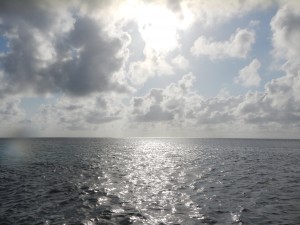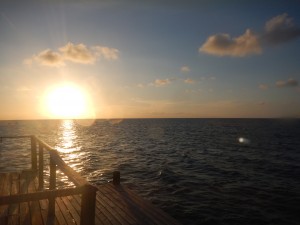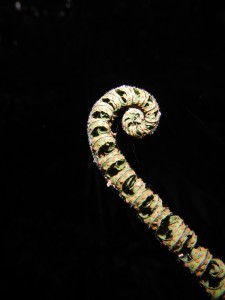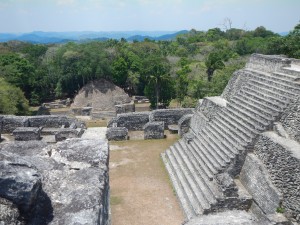Korea has a blessed geography where the mountains that consist 70% of the country are covered with deciduous forests of green, orange, and white that parade through the year. I am used to the changing hues of the forest as I watched them from my house in Seoul, lived within them in the barracks, and experienced them inside the forests whenever I hiked them. Indeed, the nature I am local to is undoubtedly beautiful. However constant human coexistence, modern extraction and exploitation have made the ecosystem devoid of much diversity. Naturally the immense biodiversity I witnessed in the rainforest and the coral reef past two weeks have overwhelmed me with the manifestation of untamed, uncontainable vigor of life in its true form I never have experienced.

After experiencing the rainforest and coral reef, I noticed three common characteristics which I believe are the sources of immense biodiversity that these two ecosystems host:
As the common prefix eco- (oikos, “house” in Greek) imply, ecology and economy share similar principles based on deliberate will for persistence and elevation. They exhibit similar analogous features that I wish to refer an economy as an ecosystem. Dependence to “capital” is one of the features. The size and vigor of an ecosystem are relative to the amount of available capital. Just as an economy grow in size and diversity with input of capital (be it foreign or domestic), biodiversity and biomass will increase as more energy and nutrient is present. Sunlight is the prime source of energy for all life. The immense biodiversity along the equator is not surprising with the blazing amount of sunlight that hit the tropical rainforest, as evident with my sunburnt skin. The high canopies of the rainforest and vast field of corals and algae pumps the ecosystem they support with energy they converted from the sunlight with amount unmatched by any other biome on Earth.
Another characteristic of a healthy and sizable economy is the rapid circulation of money. At least in theory with lots of money in the economy, people will consume more, loan more, and produce more. However, rainforest soil and the tropical ocean lack nutrient, paradoxically to the great biodiversity and abundance they hold. But think: these ecosystems are full of consumers that will extract nutrient from the environment and another. Once a tree dies or a leaf falls, or a fish dies, they will rapidly turn back into nutrient by decomposers and as much rapidly be consumed by the great number of other consumers. With great amount of source of nutrients and equally great amount of consumers, nutrients have no time to be accumulated into the soil or water.
With great availability of capital, its healthy circulation, economy diversifies, creating various niche meeting the various needs of people. Ecosystem show similar trend. As the trees create diverse canopy structures, and as reefs create complex formations, organisms that depend on them will radiate accordingly, specify, and speciate. The specific symbiosis like Azteca ant: cecropia tree, Pseudomyrmex ants: acacia trees, and Atta ants: fungus farm demonstrate such specificity.
While rainforest and coral reef ecosystems share principles to most richness and diversity, each received myself with different level of hospitality. In the forest I was part of it. I experienced the soil, the tree, air, ticks, the point of view like the other inhabitants. Without deliberate intention as that of blood sucking ticks or mosquitoes, fellow inhabitants of the forest never approached us. Subtle signs like the howler’s monkeys’ call and disturbed forest floor indicating the jaguar’s presence implied their existence. These forest animals really respected personal space. However, I was only a guest underwater. Animals recognized my presence and fled or showed aggression only when I approached them so closely.
The fragile nature of the coral reef ecosystem was striking. The visible competition between the coral reef and algae for space and sunlight highlighted the intricate nature of the corals and how special this ecosystem is. The rising sea temperature, defiling marine debris, flow of excessive amount of nutrient into the waters, all are collaboration of humanity to destroy this important ecosystem where we cannot pinpoint our judging fingers to.

Through this course I successfully realize what I like and what I can do regarding field biology which will consist significant part of my career. As I spent more time among the rainforest I learned how much I liked the place. My initial expectation was that I will like the diving and the open ocean horizon of the atoll. But the dry and pure breeze and thick canopy that shaded me from the blazing sun convinced me that rainforest is not bad at all. I should wait until I experience the rainy season and the bloom of mosquitoes but I did like the forest’s dry season. Meanwhile, I truly learned the terror of sandflies at the atoll. These small devils made unpleasant hickey marks all over my body followed by extreme itchness. I just couldn’t bear it. Also without shade, I was in direct exposure to the sunlight. Contrary to the expectations I realized myself as a “Turf” person. I love the mountains and the forest as I am more familiar to them.
The academic part of the course was far beyond my expectations. I really liked how each projects challenged us to ask the right question, make a right hypothesis, right methods, and right conclusion from the unexpected results. I learned how much I must learn and be trained to make relevant decisions regarding a research. As for the unexpected results, I will never forget when our camera trap caught a wild ocelot. The beautiful pattern of the small leopard embodied the beauty of unexpectedness gift of the nature.
The immense biodiversity that I encountered in the rainforest and coral reefs embodies the radiant will of life that seeks to rise. And this will is the will of genetic materials to proliferate. The characteristics of each species I saw came to be either as an effort to sustain itself under pressure or to expand and exploit under favorable conditions. Witnessing this principle, I accepted that the purpose of life to rise naturally reside in our species still. However, struggle to rise does not necessarily involve unjustly exploiting on others. Yes, we have to prey on others like all life does but there is an extent to which the extraction will become unnatural exploitation. Humanity has long exceeded that threshold. After this course I once again recalibrated, reinforced my will to contribute to the effort to correct humanity’s current path down to unnatural decadence back to that of natural and healthy will to sustainable power.


